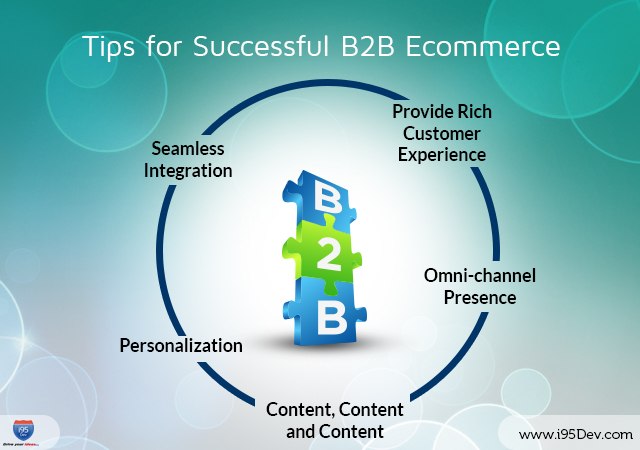B2B e-commerce is growing fast – Frost & Sullivan forecasts B2B e-commerce sales worldwide to be $12 trillion by 2020, up from $5.5 trillion in 2012. In past, most B2B companies restrained themselves from selling online because of the complexity associated with it; the technology was not at par to handle the complexity associated with B2B sales. But, with plenty of e-commerce solutions available today that offers the desired flexibility, B2B companies have started doing very well online.
Understanding the changing demographics of consumers (growth of millennial buyers who have virtually grown up online), the popularity of b2b online marketplaces such as Amazon Supply and Alibaba, and the role e-commerce plays in driving customer engagement and sales in today’s technology driven era, businesses are quickly embracing e-commerce.
As businesses embrace online trading it is important to ensure that it is done right. No matter the efforts, creating a new online b2b store or upgrading the existing platform, it is essential to focus on the following areas:
1) Customer Experience – Clinch that Competitive Advantage
Like B2C, fundamental features such as a responsive site, appealing layout, functional navigation, robust site search, etc. are equally important in B2B. In addition, on the increasing demand of business buyers, features like one-page checkout, multiple freight and payment options are also on the cards. However, certain features that uniquely boost online B2B sales include:
- Price Levels: This allows B2B organizations to sell products at different prices based on the customer group.
- Sales quote: This feature helps to create and manage customer quotations or RFQs online with real-time information on products, inventory, price, etc.
- Salesperson: This feature offers you the flexibility to assign a specific sales or customer representative to your customer; these reps can thereafter help the customer with necessary information both online and offline.
- Frequent order: Since business buyers frequently reorder the same items, this feature helps them to reuse the list last created without wasting time in redoing things.
- National Accounts: This feature helps you to define a customer as a “parent” with “child” customers added to it – such that a payment received from the parent company can be applied across any of the child customers’ payments.
- Credit Limits, Net terms, and Bill Pay: With B2B customers on the board, it is important to give them the flexibility to purchase on credit and subsequently make payments online on pre-agreed terms and conditions.
For more B2B e-commerce features read our blog Features Unique to the World of B2B eCommerce
2) Content – Reigns over Everything
E-commerce has evolved with the rest of the web with content being equally important for both. However, over the years, the format in which the content is consumed has changed. Today content is no longer restricted to text but extends to formats like images, videos, detailed product descriptions as pdf, etc. The more information you provide, the more you engage your customers by helping them understand what they are ordering online. Buyers expect an easy-to-use, highly informative, and visually appealing experience where it is easy to find what they need and make purchases.
However, creating content does not have to be complex – focus on providing all the information a buyer would need to make a decision. Depending on the industry, this could include manufacturer’s name, specifications, unit of measure, price, short and long descriptions, user manuals, installation manuals, material safety data sheets, hazardous material information, product images and videos, and more.
3) Personalization – is the Order of E-commerce Today
Personalization is a powerful tool that can help businesses drive sales, improve customer engagement and experience, and drive customer loyalty. The more information you gather and use about your customers, the better your store can be personalized to meet specific customer needs.
Personalization in B2B business can include
- Display products based on the company, location, contract terms and conditions, etc.
- Show pricing specifically designed/ negotiated for the specific customer
- Provide provisions to save orders, repeat order, etc.
For more information on e-commerce personalization, read 6 Steps to Personalize the Shopping Experience of your eCommerce Customers
4) Omni-channel Commerce – Business Anytime Anywhere
E-commerce is getting competitive and customers today are more tech-savvy. Customers expect businesses to be present across multiple channels and provide the same experience across each one of them.
Also read – Omni-Channel Experience – The Key to B2B eCommerce Success
To provide them the Omni-channel experience businesses require seamless integration between all these disconnected channels. Imagine a situation when your customer orders a product on your e-commerce store and calls your sales/ customer representative to check on the order status. Without integration, they will be clueless about this and will have to make multiple calls to help the customer – not a very efficient and consumer friendly process. Such situations can have a negative impact on customer experience.
A seamless integration between your e-commerce front end with your ERP, CRM, etc. helps to save time and effort and assists in achieving business objectives.
5) Keep your Customers Engaged
Driving customer engagement can play an important role in driving customer loyalty. Ensure that you work towards keeping consumers engaged even after the sale is made (and even if the sale is not made). How-to videos, new product launch emails, exciting offers, etc. can all be used very effectively along with marketing automation tools to drive information them and stay on top of their mind.
If you are looking for an omni-channel e-commerce solution that seamlessly integrates with your ERP system then, check out i95Dev’s Ecommerce Growth Engine (EGE). For more information you can contact us here or drop us a line at info@i95dev.com.




